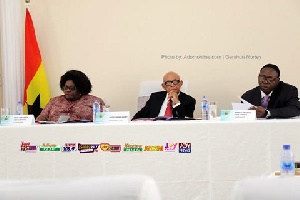 Members of the Emile Short Commission
Members of the Emile Short Commission
Politicians cannot name because they cannot shame themselves. Since the Justice Emile Short Commission of Enquiry into the Ayawaso West Wuogon Constituency By-election, several descriptions of political party thugs (or vigilante groups as it is usually called) have been proffered by politicians, which are laughable.
It started with the Minister of National Security, Mr Kan Dapaah, who sought to distract attention from these excesses by political parties by claiming that vigilantes were ‘bred’ by individuals. What he conveniently failed to add, though, was that these hooligans are normally ‘bred’ by 'individuals' with clout in a political party.
Can I, a reporter at the Daily Graphic, on my meagre salary, maintain a group of even two heftily-built men as my bodyguards? No! That would be an impossibility for me, but possible with political gurus well placed in the party and with free funds that sometimes get surreptitiously tunnelled through party structures (particularly the incumbent), or who because of financing successful presidential bids are rewarded with juicy contracts, whether they are up to the task or not!
So in this country it has long been known that the 'Azoka' boys, the pro-National Democratic Congress (NDC) vigilante group, is led by Chief Sofo Azoka, who is currently the National Vice Chairman of the party, while a former organiser of the New Patriotic Party (NPP), Alhaji Moctar Musa Bamba, formed the ‘Bamba boys’.
Now there is a proliferation of these thugs in our midst, the Invincible Forces, The Hawks, and several others.
Then there was the Member of Parliament (MP) for Ningo Prampram, Mr Sam George, who during his testimony before the Justice Emile Short Commission sought to give these groups a veneer of nobility by saying that they were community-based groups engaged in self-help projects.
Some other definitions have come from the Commission showing these vigilante groups for who they really are: militias.
In this case, however, they are like the rebels we have found in other sub-Saharan African countries, with previous histories of civil wars such as Liberia, Sierra Leone and even close neighbouring Cote d’Ivoire.
They are not civilians who can be relied on during emergencies to support security personnel, as the term militia suggests, but armed civilians that do the bidding of their agents, up the echelons of political power.
Political parties are reluctant to describe their vigilante groups as they truly are because by doing that they expose themselves.
They expose their dubiousness and hypocrisy at nurturing such thugs to terrorise Ghanaians when they are in government and have the
Ghana Police Service (GPS) under their thumbs, and when in opposition after pillaging the service and knowing that their “partners” now in office would do the same.
They cannot clearly describe political party vigilantes because it would discredit party financiers!
Political parties cannot clearly describe and name their vigilantes because it is an indictment on the way and manner they have managed our Police Service.
They keep them under their thumbs to do their bidding only and not protect common citizens when in power, but at the same time relegate officials of the service to the back burner in sensitive national security operations.
One would have thought that with all the subtle intimidation of the police through transfers, delayed promotions and a host of tactics the resulting docile force would have been better attuned to the bidding of politicians that be.
But alas! That is not so, for after all that, the politicians create special forces and give them the responsibility of terrorising those who voted them into office.
Politicians cannot name vigilante groups because Ghanaian politicians are not worth the trust we repose in them to lead.
They are not worth the time we spend queuing to vote them into power.
Citizens, however, deserve good and considerate leaders and they can dictate a change in how parties and the political elite behave and act in office.
As we approach the 2020 general election, may we all observe those who would present themselves for elections.
In their public appearances, do they have an entourage of questionable characters like macho-men?
Let citizens observe and challenge those they would be voting for next year about these worrying developments.